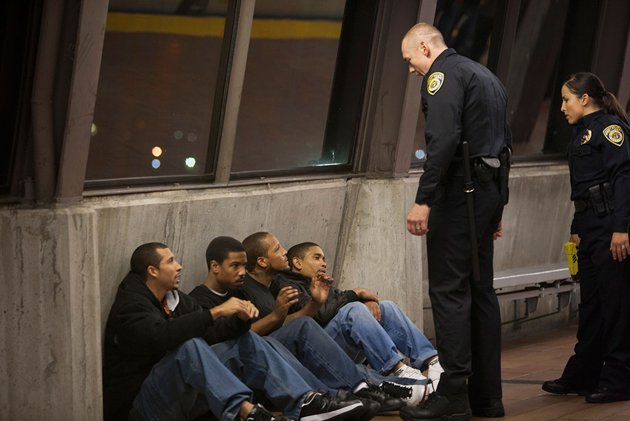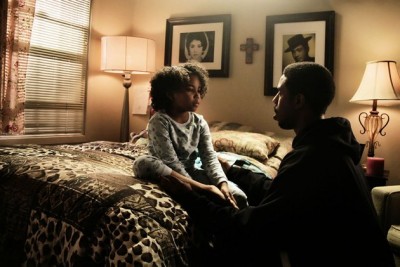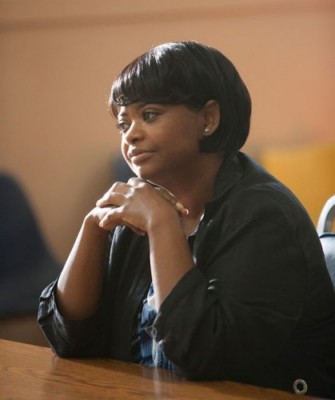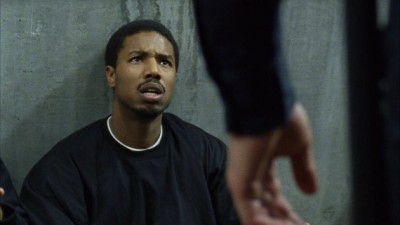
“Fruitvale Station” — a film review by Gary Chew
The first day of 2009 was the last day of Oscar Grant’s life. He was born in 1986. Film director Ryan Coogler debuts with a movie that uses the commonplace and the routine to ignite his recently released and already memorable film, “Fruitvale Station.”

The killing of Oscar Grant in Oakland, Calif. on January 1, 2009 is as vivid in the American conscience as the death of Trayvon Martin; both black and young … and killed by irresponsible quasi-police officers. “Fruitvale Station” opens at a time closely rivaling reactions to the deaths of Dr. Martin Luther King, Jr. and Medgar Evers.
If you’re only partially aware of what gave rise to Grant’s death, Coogler’s film has more information for you regarding that tragedy at an East Bay BART station where, actually, an impromptu celebration had been going on among New Year’s Eve commuters just coming into Fruitvale Station.
Since some might not know what sparked the violence, I’ll not say what did. Going into the film, I was without that specific piece of information and thus blown away. It makes what happened even more absurd.
Players in “Fruitvale Station” are flawless, especially Octavia Spencer (“The Help”) who plays Oscar’s mother. Michael B. Jordan is Oscar. You’ve likely seen him as Wallace in HBO’s “The Wire,” one of the best cable TV series ever. Melonie Diaz appears as Grant’s common law wife and mother of their young daughter. Ariana Neal plays the child. It all looks for real.

Coogler, a graduate of California State Sacramento, chronicles the last several hours of Grant’s life with his family, worrying about losing his job and concluding that he should stop selling marijuana to help make ends meet. The film doesn’t paint Oscar as an angel; he has been in the joint, and he’s been fired for being late to work. Grant is touchy about his place in the culture around him and brooks little in ways that present him with heavy-handed authority or racial hatred. But he’s a loving man and considerate of others, even a white man and his pregnant wife on a San Francisco street that New Year’s Eve.
Coogler was in close contact the Grant family while writing and shooting the project. The young director says the family was open and available … and positive on seeing the film when it premiered at the 2013 Sundance Film Festival. The picture took the Sundance Grand Jury Prize for dramatic feature as well as the Audience Award for U.S. dramatic film.
Coogler’s style is natural and low-key. His picture has the feel of a documentary, somewhat, as it goes on quite specifically showing the simple routines of Grant and those in his social circle; none of it punched up with hype. For me at times, these moments became a fleeting, pleasant diversion from what was to come. When it did come, the depicted intimate times spent, converge – sure to explode in the heart of most anyone who might see “Fruitvale Station.
Actual video of a BART police officer shooting the handcuffed Grant prefaces the film. News video of the first public demonstration at Fruitvale Station following the incident shows at the close.

Although you know what’s in store for Oscar, the outcome still – in some strange way – sneaks up and suddenly catches you in a stark and random tragedy that began just as holiday fun a commuter train – and with a mother’s wish for her son’s safety in the big city on a New Year’s Eve.
Ryan Coogler says the primary reason for making a film about Oscar Grant is for people “to think about humanity.”
I submit that Coogler’s work would be gratifying to the eyes of Dr. King and Mr. Evers. Their assassinations haunt, today, with as much force as the more recent deaths of Oscar Grant and Trayvon Martin.
As with Paul Haggis’ Best Oscar Picture, “Crash” (2006), Ryan Coogler’s “Fruitvale Station” made me think about humanity — just as the director would want. The movie also made me ask an unspoken question: “Why do we keep doing this over — again?
- Movie Review: ‘The Glorias’ - September 28, 2020
- Movie Review: ‘I’m Thinking of Ending Things’ - September 10, 2020
- Movie Review: ‘The Burnt Orange Heresy’ - August 31, 2020

